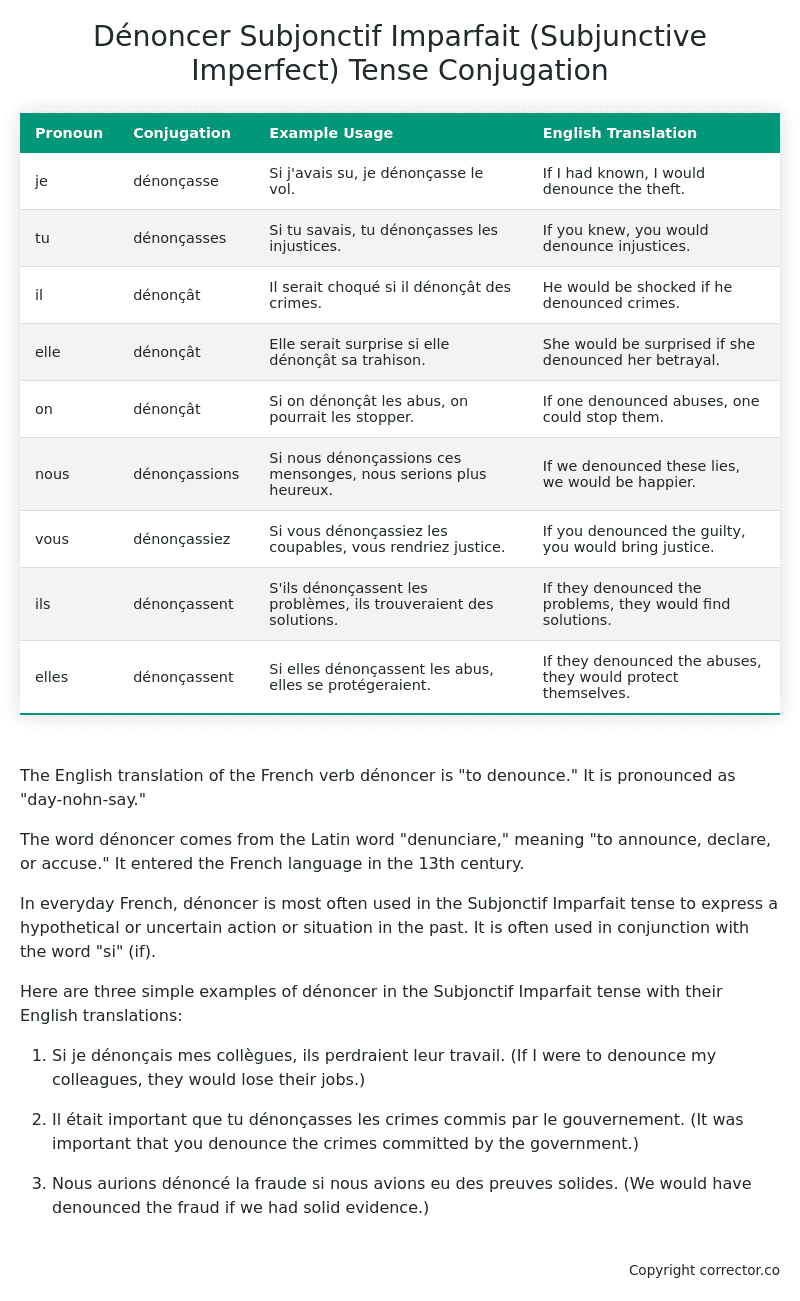Subjonctif Imparfait (Subjunctive Imperfect) Tense Conjugation of the French Verb dénoncer
Introduction to the verb dénoncer
The English translation of the French verb dénoncer is “to denounce.” It is pronounced as “day-nohn-say.”
The word dénoncer comes from the Latin word “denunciare,” meaning “to announce, declare, or accuse.” It entered the French language in the 13th century.
In everyday French, dénoncer is most often used in the Subjonctif Imparfait tense to express a hypothetical or uncertain action or situation in the past. It is often used in conjunction with the word “si” (if).
Here are three simple examples of dénoncer in the Subjonctif Imparfait tense with their English translations:
-
Si je dénonçais mes collègues, ils perdraient leur travail.
(If I were to denounce my colleagues, they would lose their jobs.) -
Il était important que tu dénonçasses les crimes commis par le gouvernement.
(It was important that you denounce the crimes committed by the government.) -
Nous aurions dénoncé la fraude si nous avions eu des preuves solides.
(We would have denounced the fraud if we had solid evidence.)
Table of the Subjonctif Imparfait (Subjunctive Imperfect) Tense Conjugation of dénoncer
| Pronoun | Conjugation | Example Usage | English Translation |
|---|---|---|---|
| je | dénonçasse | Si j’avais su, je dénonçasse le vol. | If I had known, I would denounce the theft. |
| tu | dénonçasses | Si tu savais, tu dénonçasses les injustices. | If you knew, you would denounce injustices. |
| il | dénonçât | Il serait choqué si il dénonçât des crimes. | He would be shocked if he denounced crimes. |
| elle | dénonçât | Elle serait surprise si elle dénonçât sa trahison. | She would be surprised if she denounced her betrayal. |
| on | dénonçât | Si on dénonçât les abus, on pourrait les stopper. | If one denounced abuses, one could stop them. |
| nous | dénonçassions | Si nous dénonçassions ces mensonges, nous serions plus heureux. | If we denounced these lies, we would be happier. |
| vous | dénonçassiez | Si vous dénonçassiez les coupables, vous rendriez justice. | If you denounced the guilty, you would bring justice. |
| ils | dénonçassent | S’ils dénonçassent les problèmes, ils trouveraient des solutions. | If they denounced the problems, they would find solutions. |
| elles | dénonçassent | Si elles dénonçassent les abus, elles se protégeraient. | If they denounced the abuses, they would protect themselves. |
Other Conjugations for Dénoncer.
Le Present (Present Tense) Conjugation of the French Verb dénoncer
Imparfait (Imperfect) Tense Conjugation of the French Verb dénoncer
Passé Simple (Simple Past) Tense Conjugation of the French Verb dénoncer
Passé Composé (Present Perfect) Tense Conjugation of the French Verb dénoncer
Futur Simple (Simple Future) Tense Conjugation of the French Verb dénoncer
Futur Proche (Near Future) Tense Conjugation of the French Verb dénoncer
Plus-que-parfait (Pluperfect) Tense Conjugation of the French Verb dénoncer
Passé Antérieur (Past Anterior) Tense Conjugation of the French Verb dénoncer
Futur Antérieur (Future Anterior) Tense Conjugation of the French Verb dénoncer
Subjonctif Présent (Subjunctive Present) Tense Conjugation of the French Verb dénoncer
Subjonctif Passé (Subjunctive Past) Tense Conjugation of the French Verb dénoncer
Subjonctif Imparfait (Subjunctive Imperfect) Tense Conjugation of the French Verb dénoncer (this article)
Subjonctif Plus-que-parfait (Subjunctive Pluperfect) Tense Conjugation of the French Verb dénoncer
Conditionnel Présent (Conditional Present) Tense Conjugation of the French Verb dénoncer
Conditionnel Passé (Conditional Past) Tense Conjugation of the French Verb dénoncer
L’impératif Présent (Imperative Present) Tense Conjugation of the French Verb dénoncer
L’infinitif Présent (Infinitive Present) Tense Conjugation of the French Verb dénoncer
Struggling with French verbs or the language in general? Why not use our free French Grammar Checker – no registration required!
Get a FREE Download Study Sheet of this Conjugation 🔥
Simply right click the image below, click “save image” and get your free reference for the dénoncer Subjonctif Imparfait tense conjugation!

Dénoncer – About the French Subjonctif Imparfait (Subjunctive Imperfect) Tense
Formation
Common Everyday Usage Patterns
Interactions with Other Tenses
Subjonctif Présent
Indicatif Passé Composé
Conditional
Conditional Perfect
Summary
I hope you enjoyed this article on the verb dénoncer. Still in a learning mood? Check out another TOTALLY random French verb conjugation!


